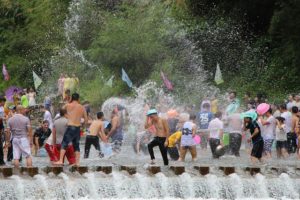The Songkran festival is one of the most important celebrations in Thailand and is officially celebrated annually between the 13th and 15th of April. It is a guaranteed mixture of fun and excitement – streets full of drenched and smiling people, music all around, and a cleansing atmosphere. Although the festivals have been canceled all over the country because of the coronavirus, small gatherings among families and friends at home are not prohibited.
Origins and history of the Songkran festival
The word Songkran originally comes from Sanskrit and means a change or transition. But more precisely, Thais use it to mark the beginning of their New Year. It is believed that this is the period of time where people need to leave behind the unpleasant things that happened to them, along with their bad thoughts, in order to cleanse themselves to start anew.
Nobody knows exactly how old this tradition is, but as it originates from Buddhism it might well have been celebrated for thousands of years. Back in the day, the essence of Songkran was to cleanse yourself through the purifying powers of water. People would usually go to local monasteries and offer food and blessings to the monks. After that, the monks would go through a cleansing ceremony – scented water would be poured over them and prayers and blessings for a better year would be made. According to tradition, people would collect scented water and bring it home. Then, they would sprinkle it over their elderly parents or relatives who would give them new year blessings in return.
The Songkran festival today
As expected, the Songkran festival nowadays looks a bit different. To imagine it better, keep in mind that in 2011 the Thai New Year celebrations went into the Guinness World Records as “The largest water gun fight in the world”!
The streets are full of laughing kids, water gun stands and of course – water! The old tradition of bringing a cup of water out on the street to sprinkle over strangers has turned into a mass water gunfight. People are using everything – from water toys to hoses, to buckets – to drench each other in water for good luck and of course, pure fun. So don’t be startled if somebody pours a bucket of water over you saying “sa-was-dee pee mai” – they are merely wishing you a happy New Year.
 The celebration takes place throughout the whole country, but it is immensely popular in Thailand’s cultural capital Chiang Mai. People in traditional costumes carry large Buddha statues along the streets. Some are singing, others are dancing and there is water everywhere. In Bangkok, Thais organize a huge electronic music festival. This is tied to the myth that loud noises chase away the evil spirits.
The celebration takes place throughout the whole country, but it is immensely popular in Thailand’s cultural capital Chiang Mai. People in traditional costumes carry large Buddha statues along the streets. Some are singing, others are dancing and there is water everywhere. In Bangkok, Thais organize a huge electronic music festival. This is tied to the myth that loud noises chase away the evil spirits.
However, the Songkran festival is not only water fights and festivals – there is a huge body of traditions associated with the festivities that Thais respect as well. For example, the first day of Songkran is when people visit monasteries to keep the old tradition of offering food to the monks and sending their prayers and blessings for the year that is to come. After that, Thais usually spend time thoroughly cleaning their houses with the goal of chasing the bad spirits and energy out of their homes.
Another ritual that continues to be practiced is the pouring of scented water over Buddha statues, while also praying, thanking the elders, and wishing for each other’s prosperity. The young still pay respects to their elders by sprinkling their hands with the scented purifying water, after which everybody gathers around the table for a big, festive family meal. Due to the ongoing viral epidemic, people are expected to focus only on this ritual and enjoy their time at home.
The magic of the Songkran
This is a festival celebrating the cleansing of the soul, an event that brings the family together and makes people believe in a better tomorrow. It might be celebrated differently depending on the region, but the essence remains the same. Whether it’s electronic music festivals, water fights on the streets or going to the monastery, it is all done with the purpose of genuinely wishing the best for the people closest to you.

